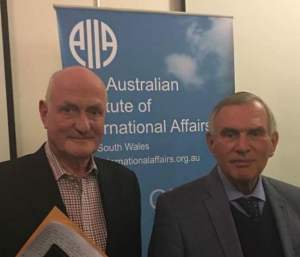Thailand: revolting peasants and oily oligarchs
On Tuesday 20 September former Australian ambassador to Thailand, Cavan Hogue, gave his assessment of the current situation in Thailand to around 50 AIIA NSW members and friends at Glover Cottages.
Cavan began with a bit of history – Sir John Bowring’s negotiation of a treaty with King Chulalongkorn in 1855 which fixed borders between Thailand and Malaya and allowed British traders free trade and restricted property rights in Bangkok. The King negotiated a similar treaty with the French the following year in respect of Thai-Indochinese borders. During his two visits to Europe, Chulalongkorn mimicked the ways of European royalty, cleverly out-feathering and out-medalling them, which held Thailand back from falling off the precipice of European colonisation.
Chulalongkorn understood hard and soft power and used them alternately to his advantage. He set a flexible social template for modern Thailand which among other things allowed the peaceful integration of the Chinese. He and his successors applied the same philosophy to foreign affairs. Thailand joined Britain and France against Germany and Austria-Hungary in World War One, but declared war against them and allowed free access to the Japanese for their invasion of Malaya, Singapore and Burma in World War Two. The tradition of flexibility also shaped modern Thailand’s transformation from absolute to constitutional monarchy, and to recurrent alternation between military coups and civilian rule by elected governments. During the Cold War, Thailand sent troops to join UN forces in Korea, and joined American and other forces in fighting the Vietcong and North Vietnamese. In the post-Cold War period, the Thai army continued either to rule directly, or allow a civilian government to do so. But in both cases, the military underwrote the monarchy.
Cavan said the situation followed a relatively stable, or at least predictable, course until the advent of Thaksin Shinawatra who with his Thai Rak Thai Party entered politics in 1994, and who was elected as prime minister in 2001. Unprecedentedly for a prime minister, Thaksin was popular with the rural poor from the north and north-east of the country (the majority), but increasingly unpopular with the sophisticates in Bangkok (the moneyed minority), who did not believe that ‘uninformed’ peasants should vote. Burdened with accusations of tax avoidance, Thaksin was overthrown by the military in 2006, which ruled until Thaksin’s sister Yingluck, was elected as prime minister from 2011 until 2014, when the military again imposed their rule.
This, said Cavan, brings us up to the present. A new constitution drafted by the military and giving them more power was passed, but as it is the twenty-first since 1932, its endurance should not be assumed. As for the future, Cavan was unwilling to make predictions, particularly optimistic ones. Everyone, he said, loved King Bhumipol Adulyadej, who is revered for his accessibility, and is still remembered for bringing the military into line after they massacred students at Thammasat University in October 1976. But the King is sick, and there is uncertainty about who will succeed him – his son Crown Prince Vajiralongkorn or his sister Crown Princess Sirindhorn. Meanwhile, the fissure in Thai society between city and country dwellers is politically expressed by Yellow shirt activists (city) and Red shirt activists (country). One blessing in this uncertain situation is that the Thai economy continues to do quite well.
Report by Richard Broinowski
